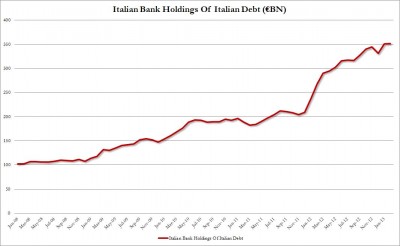For the southern European states, the crisis this summer will become as characteristic as sandy beaches, the sun, or frutti di mare for dinner. And maybe some northern neighbours will join the party too.
The Cypriot stories will slowly but surely disappear from the front pages. Capital controls persist and the country will probably face a double-digit recession, which will stay around for some time. The initial outrage about the fact that some of the well-informed managed to transfer their money from their accounts before the agreement on participation of depositors in the bank losses came to light, fades away. The investigation has been suspended for now. But let’s leave the miserable Cyprus and make a Eurotrip.
Slovenia is a clear case. Its lady prime minister keeps repeating that they will manage the situation on their own, but nobody believes her words, probably neither does she. The level of bad debts in the largest state-owned banks reaches 30%, in the others around 20%. It never ends well when banks grant loans on the basis of corny political orders and the rescue could cost around 7 billion euros, a fifth of Slovenian GDP.
Portugal has been the guy stirring up the euro-crisis waters last week. Their Constitutional Court decided that part of the austerity programme concerning decreasing the wages of state employees is in fact illegal. Portuguese politicians are all unhappy about that and we should be as well. How will they repay the money they borrowed from us? They solved the problem quite ingeniously. Part of the salary will not be paid in cash, but in treasury bills. By doing so, they will elegantly postpone the problem into future, and de facto they will introduce a brand new currency parallel to euro. Troika rushed with help. Portugal and Ireland will supposedly be granted a 7-year debt repayment postponement.
Let us not forget about Spain, which is still the most seriously sick man of Europe. Its banks got promised 10 times more money than the Cypriot ones, and the very Spanish state administration will probably ask for more money soon. The deficit for 2013 is already predicted to be 6% instead of the originally promised 4.5% – and the calendar only says April. In the first three months of this year, 45% more companies went bankrupt compared to the same three months last year. The party continues only thanks to forced bond shopping by whoever is still able to do so. For instance, Spanish Social Fund invested 97% of entrusted money in Spanish bonds. The local pensioners for sure feel very safe now.
We can see similar strategy also in Italy, where the local banks are buying the state bonds in large, therefore, helping to keep the price in a tolerable range. Keynesian “in the long run we are all dead” has been replaced by the improved “in the middle run different politicians will have to tackle the problem”.
How about the crisis veteran, Greece? The government started another never-ending hassle with Troika about whether Greece is meeting all requirements, and whether they will receive another tranche of their loan. Social situation continues to deteriorate. A new big problem is the property tax. It is to be settled together with electricity bills, but more and more people in Greece are not able to pay and what follows is an electricity cut. On average 1000 Greek households are being disconnected from the power supply every day. In other words, 1% of Greek households return to the Middle Ages every month.
If you fancy betting on the black stallion of the crisis, it won’t be Spain or Italy, but France. Apart from having deficits and unemployment on the rise, Hollande’s government cannot shake off the scandal caused by the ex-minister with his euros in Swiss accounts. It is then much harder to explain why people should pay higher taxes. Exhausted politicians are now begging Germans to stay patient.
Most European politicians are in unison in their statements that Cyprus was an exception which won’t be repeated. But it is not so close to the truth, as the European boss for economic matters, Olli Rehn, lately admitted. The prepared European act for banks reportedly counts on the participation of large depositors in a possible rescue of their bank. The rumours even say that the losses will be imposed also on the interbank deposits. After five years of bad steps, when banks were saved exclusively by the taxpayers’ money, it’s about time.
We wrote many times about the meaninglessness and disadvantages of the financial transactions tax. The latest report by Barclays estimates losses in Europe caused by imposing such a tax to be 0.3% of GDP. There is never enough economic downturn in Europe. What will be the money used for? For example, also for half a million rent for Baroness Ashton, High Representative of the Union for Foreign Affairs and Security Policy (have you ever imagined something like that exists?) …for her loyal service to the country, pardon, the European Union.
We live in times of a roaring monetary crisis, when functioning of the banking system with fractional reserves and state central bank has to face questions from people who very suddenly find out that their savings are only fictitious and that they are actually poor. For this reason, we have to mention Bitcoin, a crypto quasi-currency. This originally inconspicuous and private product has championed front pages of all major media in recent days. After technical problems of MtGox exchange, a panic appeared, but the problem has been staved off already. Although we definitely do not recommend to pledge a house and put all your money into Bitcoin; we dare to forecast that we will hear more and more about it in near future.
Let only soap bubbles burst for you!
(Translated by Jakub Pivoluska)




